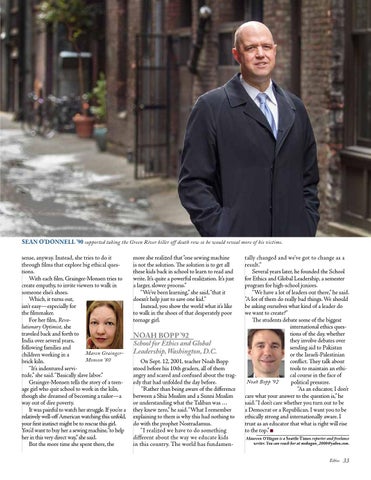SEAN O’DONNELL ’90 supported taking the Green River killer off death row so he would reveal more of his victims.
sense, anyway. Instead, she tries to do it through films that explore big ethical questions. With each film, Grainger-Monsen tries to create empathy, to invite viewers to walk in someone else’s shoes. Which, it turns out, isn’t easy—especially for the filmmaker. For her film, Revolutionary Optimist, she traveled back and forth to India over several years, following families and Maren Graingerchildren working in a Monson ’80 brick kiln. “It’s indentured servitude,” she said. “Basically slave labor.” Grainger-Monsen tells the story of a teenage girl who quit school to work in the kiln, though she dreamed of becoming a tailor—a way out of dire poverty. It was painful to watch her struggle. If you’re a relatively well-off American watching this unfold, your first instinct might be to rescue this girl. You’d want to buy her a sewing machine,“to help her in this very direct way,” she said. But the more time she spent there, the
more she realized that “one sewing machine is not the solution. The solution is to get all these kids back in school to learn to read and write. It’s quite a powerful realization. It’s just a larger, slower process.” “We’ve been learning,” she said, “that it doesn’t help just to save one kid.” Instead, you show the world what it’s like to walk in the shoes of that desperately poor teenage girl.
Noah Bopp ’92 School for Ethics and Global Leadership, Washington, D.C.
On Sept. 12, 2001, teacher Noah Bopp stood before his 10th graders, all of them angry and scared and confused about the tragedy that had unfolded the day before. “Rather than being aware of the difference between a Shia Muslim and a Sunni Muslim or understanding what the Taliban was … they knew zero,” he said. “What I remember explaining to them is why this had nothing to do with the prophet Nostradamus. “I realized we have to do something different about the way we educate kids in this country. The world has fundamen-
tally changed and we’ve got to change as a result.” Several years later, he founded the School for Ethics and Global Leadership, a semester program for high-school juniors. “We have a lot of leaders out there,” he said. “A lot of them do really bad things. We should be asking ourselves what kind of a leader do we want to create?” The students debate some of the biggest international ethics questions of the day, whether they involve debates over sending aid to Pakistan or the Israeli-Palestinian conflict. They talk about tools to maintain an ethical course in the face of Noah Bopp ’92 political pressure. “As an educator, I don’t care what your answer to the question is,” he said. “I don’t care whether you turn out to be a Democrat or a Republican. I want you to be ethically strong and internationally aware. I trust as an educator that what is right will rise to the top.” ■ Maureen O’Hagan is a Seattle Times reporter and freelance writer. You can reach her at mohagan_2000@yahoo.com. Ethics
33
